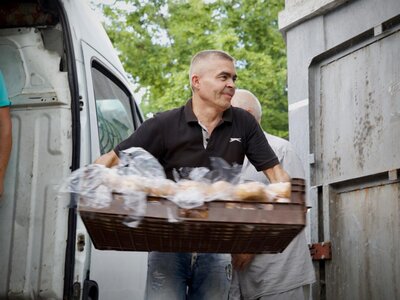Emergency
Ukraine
- 5 million
- people need food and livelihood assistance
- 1.5 million
- people reached on average every month by WFP
- US$231 million
- needed to sustain WFP operations until August 2025
Якщо ви в Україні і потребуєте допомоги чи інформації, натисніть тут
The war in Ukraine continues to displace people, damage infrastructure, disrupt supply chains and hold back the country’s economy. A total of 5 million people (15 percent of the population) need food and livelihood assistance.
A total of 3.6 million Ukrainians are internally displaced and nearly 6 million are living as refugees in Europe. Many of those who remain have lost their livelihoods, especially in areas close to the front lines. Those who returned are struggling to rebuild their lives, having run out of money or found their homes reduced to rubble.
The war and the energy crisis – the latter resulting from attacks on infrastructure – are disrupting food production and commercial supply chains inside the country, leaving many communities in the east and south with no reliable access to food. The war has turned vast areas of farmland into deadly minefields - approximately 25,000 square kilometres of agricultural land are potentially contaminated with explosive ordnance.
What the World Food Programme is doing to respond to the Ukraine emergency
-
Food assistance
-
WFP delivers food kits and ready-to-eat food rations, primarily in hard-to-reach and frontline areas under intense fighting, where commercial supply lines are disrupted and access to food is unreliable. Food kits typically comprise wheat flour, pasta, oats, buckwheat or millet, sunflower oil, canned meat or beans, sugar and salt.
-
Cash assistance
-
WFP is prioritizing cash assistance wherever banks are functioning and food is easily accessible. Cash assistance gives people the freedom to meet their essential needs as they choose, and stimulates local economies. WFP has distributed more than US$708 million since March 2022.
-
Support to Ukrainian refugees in Moldova
-
WFP serves daily hot meals to more than 1,700 Ukrainian refugees living in accommodation centres and provides bi-monthly cash assistance to families hosting Ukrainian refugees.
-
Emergency telecommunications and logistics
-
On behalf of the United Nations, WFP coordinates humanitarian logistics and telecommunications services in Ukraine as the lead organisation of the Logistics Cluster and the Emergency Telecommunications Cluster. The Logistics Cluster consolidates and shares information on logistics services, facilities and access constraints, provides road transport, cargo delivery and storage services, and supports cargo consolidation and planning for humanitarian convoys.
-
Demining and food systems
-
WFP is partnering with FAO and specialist demining organizations in the Kharkiv and Mykolaiv regions to help food producers resume agricultural work safely, including by surveying land for the presence of mines and other explosives, clearing it where necessary, rehabilitating soils, and giving cash or vouchers to buy seeds and equipment to restart production. A total 50 percent of Ukrainians in rural areas rely on subsistence farming, and household-level production represents 32 percent of the country's total agricultural output. WFP continues to scale up its procurement from Ukrainian food producers, both for food assistance inside the country and for humanitarian operations globally.



